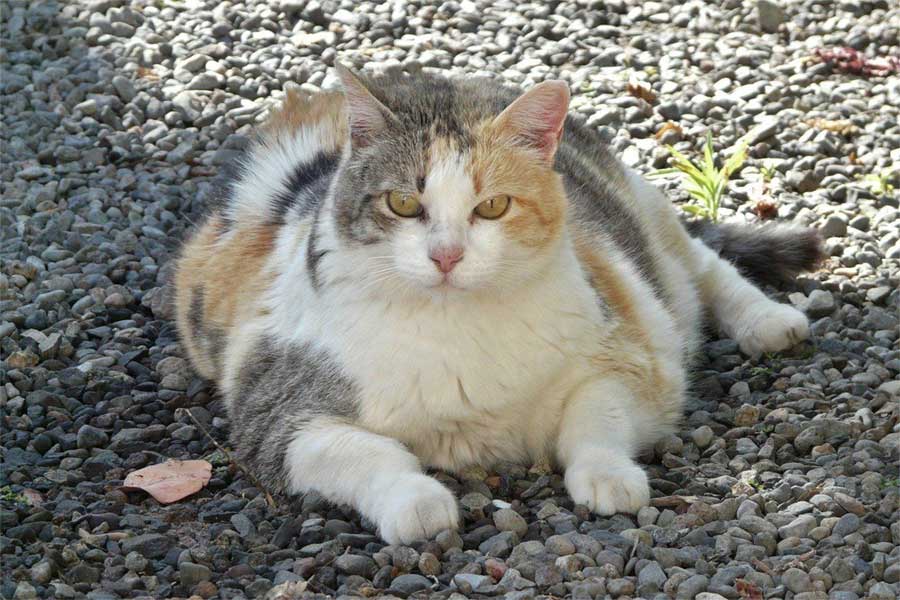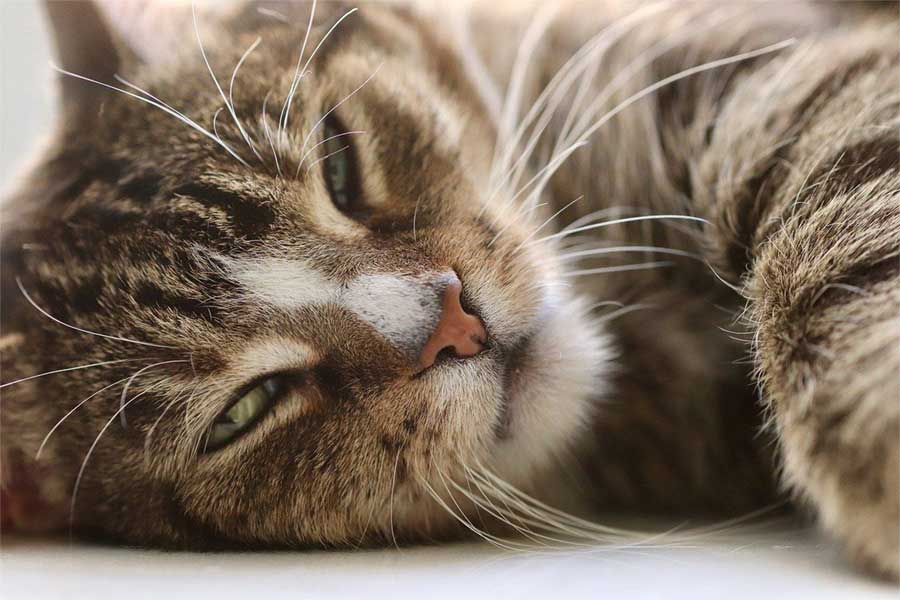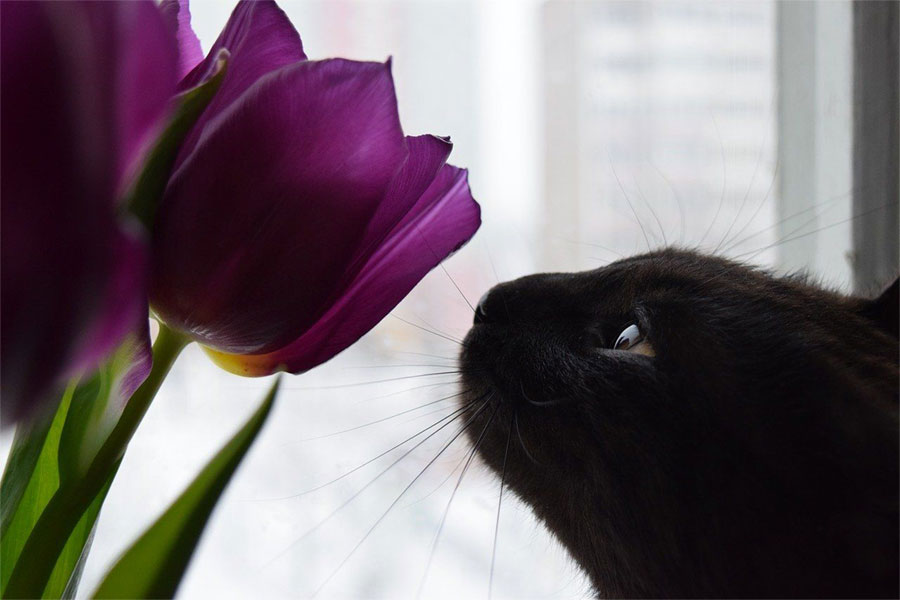My Cat is Lethargic: What’s Causing It?

This month’s blog will discuss lethargy in cats. Cats are infamous for sleeping most of the day, with short bursts of activity usually at night. When a cat becomes abnormally inactive and is sleeping even more than usual there might be cause for concern.
Lethargy is defined as; “a pathological state of sleepiness or deep unresponsiveness and inactivity.” Lethargy is a common complaint we hear from pet owners when their cat is sick. Signs of lethargy in cats include playing less, hiding or shying away from human contact, eating less and not grooming itself properly. Lethargy is not a very specific symptom and can be present in many different conditions.
In order to identify what is causing lethargy we have to take into consideration other symptoms the cat may be showing. The list of causes of lethargy is long, but with a detailed medical history from cat owners and appropriate examination and testing, we can usually identify the cause.
Causes of Lethargy in Cats
Obesity/Arthritis – When cats are overweight the excess burden puts more strain on their joints and cardiovascular system. This makes it uncomfortable for the cat to exercise and play. Overweight cats are much more prone to developing arthritis and joint pain. This creates a vicious cycle and as the cat’s activity levels decline, your cat will put on more weight. If your cat has gained weight and is lethargic, it is important to stop this cycle. To prevent future weight related health issues discuss a safe weight loss protocol with your veterinarian.

Viral, Bacterial or Parasitic Infections – Viral and bacterial infections can make your cat feel sick. Fevers brought on by infections will also make your cat lethargic. There are many common viruses that affect cats like Feline Upper Respiratory Infection (FURI), Panleukopenia (FP), and Feline Leukaemia Virus (FeLV). Regular annual vaccinations greatly reduce the risk of your cat contracting these infections. Bacterial infections can be the result of broken or infected teeth, cat bite abscesses, or internal infections. Parasitic infections are common in cats, especially if they hunt mice or birds or if they are exposed to contaminated feces of other cats. Heavy worm burdens can affect your cat’s digestive and immune systems. If your cat is showing signs of infection along with lethargy and/or fever you shouldcontact your veterinarianto have them examined.
Respiratory Problems – Cats can suffer from respiratory conditions like asthma and infections from bacteria, viruses and fungi. Cats may also develop secondary lung and airway problems from conditions like congestive heart failure and trauma.
When breathing becomes compromised due to respiratory disease, there isn’t good oxygen flow to the blood and your cat will become lethargic as a result. You may also see other symptoms like increased breathing rate, panting, coughing/gagging and hiding. Respiratory problems can be life threatening and should be addressed as soon as possible.
Cardiovascular Disease – Cardiovascular disease involves conditions affecting the heart and vascular system. Cats most commonly suffer from hypertrophic cardiomyopathy, and less frequently from dilated cardiomyopathy, heart valve disease and congenital heart defects. Cats can hide heart disease quite well and they often live with it for many years before showing any signs. Lethargy is one of those signs. Other signs like a heart murmur or arrhythmia are only identified by listening to the heart with a stethoscope, so annual wellness exams by your veterinarian are important to identify these issues early. To diagnose heart disease, advanced testing is usually required. Your veterinarian may require x-rays or ultrasound to diagnose heart disease.

Gastrointestinal Disturbances – Any condition that adversely affects the stomach or intestine can cause lethargy. Vomiting, diarrhea and constipation may also be present or the cat may stop eating or drinking. Nausea may also prevent your cat from eating and that lack of food energy will result in lethargy. These conditions can result from many different causes like ingestion of a foreign body, chronic constipation, food intolerances and viral infections to name a few. If you suspect your cat is lethargic because of a gastrointestinal problem it is best that you have your cat examined by your veterinarian right away.
Urinary/Kidney Disease – Urinary tract and kidney disease are relatively common in the cat. Lethargy is a common sign associated with these disorders. Urinary blockages (usually seen in male cats) prevent the cat from being able to pass urine. The cat may make many trips to the litter box and may vocalize when they try to urinate. Owners sometimes find their cat lying in the litter box not wanting to move due to pain and weakness. If you suspect your cat has a urinary blockage it is aveterinary emergency and you should have your cat examined right away. Kidney disease has many causes, but the result is that the cat’s kidneys become unable to properly filter waste from the blood. The buildup of these waste products makes your cat feel sick. Signs like lethargy, weight loss, increased drinking and urinating and incontinence occur. Blood and urine testing are necessary to identify kidney disease.
Anemia – Just like in humans, cats can develop anemia from a number of different causes. Anemia is a reduction in the number of circulating red blood cells and/or hemoglobin. When red blood cell numbers are decreased, the body’s ability to supply oxygenated blood is compromised. The result is a feeling of weakness or lethargy. Other signs of anemia are pale gums and increased heart rate. A complete blood count is required to diagnose anemia and a full exam is required to determine the cause. If you suspect your cat is suffering from anemia make an appointment with your local veterinarian right away.
Diabetes – Diabetes is fairly common in cats and when undiagnosed or untreated can be a cause of lethargy. The diabetes we see in cats is much like the type 2 diabetes we see in people. Diabetic cats are unable to produce enough insulin to properly convert blood sugar to energy. Lethargy along with increased thirst and urination are common signs. Weight loss is also seen. Diabetes is routinely diagnosed with blood and urine tests and can be treated in cats.

Toxin Exposure – There are many toxins in our environment that can adversely affect cats. The most common are plants. They include lilies, autumn crocus, daffodils and tulips to name a few. Ingestion of even small amounts of lilies causes kidney failure in cats. Autumn crocus and daffodil ingestion cause vomiting, diarrhea, heart arrhythmia and can lead to death. Tulips are less toxic but they can cause vomiting and diarrhea. Other toxins to consider are human medications or foods that were accidentally ingested like Tylenol, Ibuprofen, onion or garlic. Herbicides or insecticides used in your yard or neighbourhood can also poison your cat. Antifreeze that has been spilled or leaked from a vehicle is another possible toxin. Signs of toxin ingestion are most often specific to the toxin itself, but all should include lethargy. With any type of toxin exposure, early diagnosis and treatment are very important to limit the damage that is done. Call your veterinarian right away if you suspect your cat has ingested a poisonous substance. At the end of this article there is a link to the ASPCA’s Animal Poison Control page. They have a detailed list of toxins and associated symptoms for all pets.
The list of possible causes for lethargy in a cat is long. In order to understand why your cat seems lethargic you need to take into consideration other signs or symptoms that can help focus in on the real cause. If you suspect there is a medical issue that is causing your cat’s lethargy, it is important tobring your cat in for an examination by your veterinarian. Your pet’s health is our first priority and we can help determine why your cat is acting lethargic.